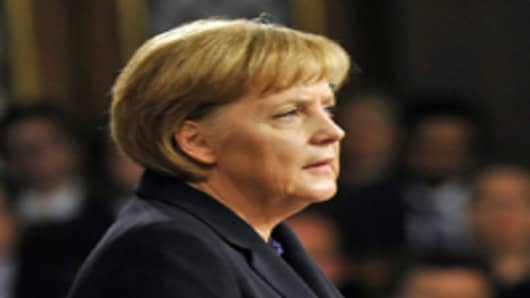Markets have cheered a surprisingly broad European package of measures to tackle the government debt crisis that has over the past year threatened the existence of the euro currency.
On the weekend, eurozone leaders increased the size of the bailout fundand lowered the interest rates on the loans bailed-out Greece has taken out.
They also revealed that the bailout fund can buy bonds directly from governments in exceptional circumstances but only if those countries agree to further austerity measures. Greece was the big winner in the markets on Monday, with its bond and stock prices surging.
Portugal and Spain — other 'peripheral' countries with heavy debts — also saw gains on hopes the deal will give the EU the firepower and tools to deal with their crises. Ireland enjoyed no such rallies, however, as its government failed to clinch easier bailout terms.
The euro rose 0.3 percent on the day at $1.3971 despite global jitters in the wake of Japan's massive earthquake.
"The deal secured by EU leaders was arguably at the higher end of both the market's and our own expectations, while most decisions were not expected to be announced so soon," said Frederik Ducrozet, eurozone economist at Credit Agricole.
"One reason for this pleasant surprise might have been the renewed tensions in the peripheral bond market last week." In the run-up to last week's meeting, there was not much confidence that the leaders would agree to anything concrete, especially as German Chancellor Angela Merkel had been sounding an increasingly strident tone against paying up for profligate governments.
In the event, Merkel proved somewhat more flexible than expected as she backed calls to raise the financial firepower of the bailout fund — the European Financial Stability Facility — to euro440 billion ($606 billion) from the previous euro250 billion and allowed it to buy bonds on the open market.
By mid-morning London time, the ten-year yield on Spanish government bonds was down 0.17 percentage point to 5.25 percent, while Portugal's dropped 0.16 percentage point to 7.44 percent.
Greece's equivalent cost of borrowing was down a massive 0.59 percentage point to 12.22 percent. Stocks also pushed higher. Greece's ASE Composite Index spiked 4.5 percent to 1,652. Spain's IBEX was up 2 percent at 10,609, while Portugal's PSI 20 rose 0.9 percent to 7,967.
Greece was the standout performer as investors applauded the 1 percentage point decrease in its bailout loan interest rate and the fact that its repayment period was more than doubled to 7 1/2 years.
Portugal's market gains were more mixed. It was helped by the prospect that the bailout fund could buy its bonds on the open market.
The country, however, could still end up requiring a bailout, analysts said. After all, its benchmark bond yield remains above the 7 percent that the government has said will be unsustainable in the long run.
"These proposals are set to strengthen the fund's ability to deal with future bailout requests but in no way allow it to forestall them," said Richard McGuire, a fixed income strategist at Rabobank International.
"As such, our initial take is that peripheral tensions are, ultimately, set to continue to mount pushing one or more countries into the — soon to be stronger — arms of the EFSF." One place where there was little euphoria was Ireland, which saw its main stock market and bond prices stand little changed.
The reason was that Ireland, which became the second euro country to get bailed out last November, did not get a similar deal to that of Greece because the government effectively refused to increase its super-low corporate tax rate.
Ireland's new Finance Minister Michael Noonan defended the government's position, arguing that higher corporate taxes would hurt manufacturing and exports, making it even harder for Ireland to repay its massive debts.
"We see export-led growth as the tool to recovery and obviously the tax regime that we apply in Ireland underpins that sector of the economy," Noonan said as he arrived in Brussels for a monthly meeting of eurozone finance ministers.
He also emphasized that Saturday's EU deal did not address the issue central to Ireland's crisis, namely how massive problems at the country's banks drove the Irish state to the brink of financial collapse.
The results of special stress test on Ireland's banks due at the end of the month will likely reveal capital holes that go beyond the euro10 billion that were foreseen for initial bank recapitalizations in the country's euro67.5 billion bailout deal, Noonan said.
"Affordability isn't so much the issue as sustainability and as so long as it continues to be seen as part of sovereign debt rather than distinct bank debt there remains a problem," he told reporters.
Finance ministers meeting in Brussels Monday and Tuesday will have to work out the details of the broad deal leaders nailed down Saturday.
"A lot remains to be done," said German Finance Minister Wolfgang Schaeuble. EU leaders plan to present their "comprehensive solution" to the debt crisis at their next summit on March 24-25.


